The Storyteller
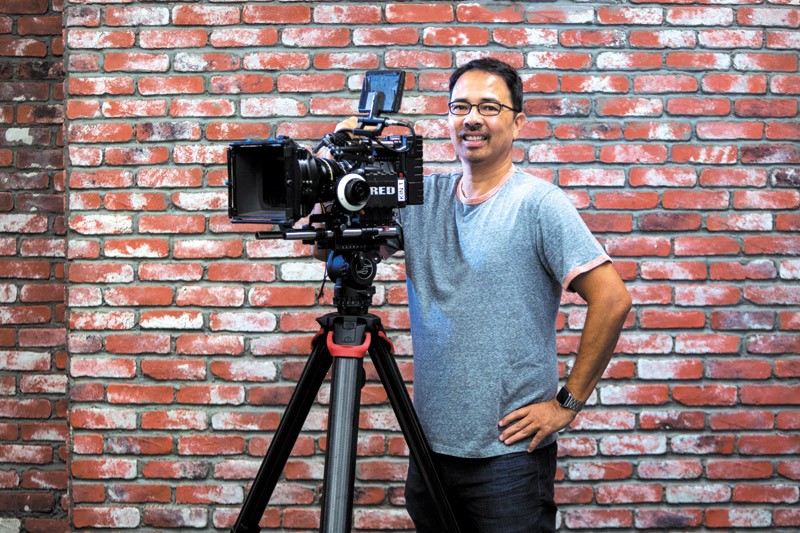
James Sereno. ANTHONY CONSILLIO PHOTO
Local producer and director James Sereno is a man of many talents with a portfolio of commercials and films residents are sure to instantly recognize.
If the name James Sereno doesn’t ring any bells, don’t be too alarmed. He may very well be the most famous person in Hawai‘i no one has ever heard of.
For more than 15 years, Sereno and his media company Kinetic Productions have had a hand in much of what residents see on TV — in between the shows they are tuning in for, that is. He and his business have produced commercials for everyone from American Savings Bank and Island Insurance to HEMIC and Hawaiian Electric. One of his most notable tasks included selecting and filming a sheltie Hawai‘i has affectionately come to know as Alex, the loyal mascot of Central Pacific Bank.
Even visitors have had a taste of Sereno’s work. He and Kinetic Productions put together the Hawaiian Airlines in-flight safety video that airs before takeoff.
Producing and directing commercials is only one aspect of what Sereno devotes his craft to, though. Throughout the years, Sereno also has experimented with narrative work, earning a BAFTA for his short film Silent Years. In fact, if all goes well, Sereno might soon be making his TV debut, too.
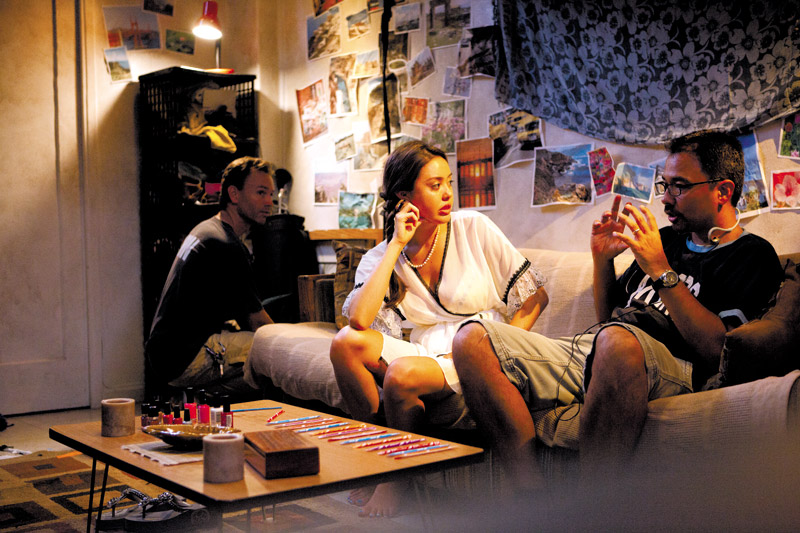
Behind the scenes of James Sereno’s first film as director, Paradise Broken
He may wear many hats, but at the root of everything is a desire to tell a story.
“I’m just a little kid from Kapahulu that had this idea, and today, I get to tell all kinds of stories,” he says.
Storytelling, Sereno is quick to point out, is simply a part of who he is.
“(It’s) in my DNA,” he says. But as a longtime movie fanatic — Star Wars is among his favorites — Sereno admits that, as silly as it sounds, he had never realized that people were responsible for making them.
That he ended up working in the industry might best be described in one word: serendipitous.
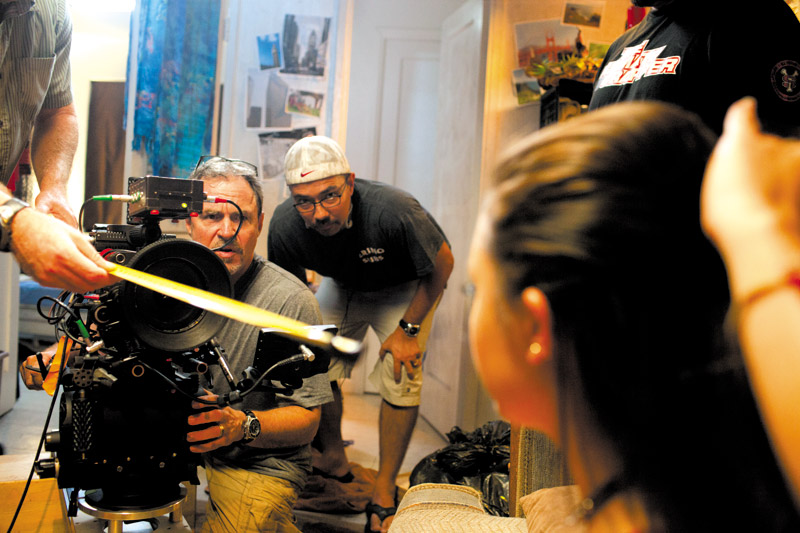
It was chance, for example, that a friend of his studying at University of Southern California recommended he take up film there. It was luckier yet that Sereno landed a job at Walt Disney Studios right after graduating. And when that work just didn’t feel quite right and Sereno found himself struggling with running his own production company in Los Angeles — what he refers to as Kinetic Version 1 — it was fortuitous that he discovered Team One, an ad agency looking to hire a junior producer.
So it was while he was working there, on commercials for big names like Lexus, that Sereno not only honed a new passion but also began perfecting what later would become his profession.
Four years into the job, and all was going well. Sereno was on his way to getting a promotion — and then he quit.
“I realized that wasn’t the destiny that I wanted,” he says. “I really wanted to have my own production company. I wanted to come home.”
It wasn’t quite the homecoming Sereno was hoping for, though.
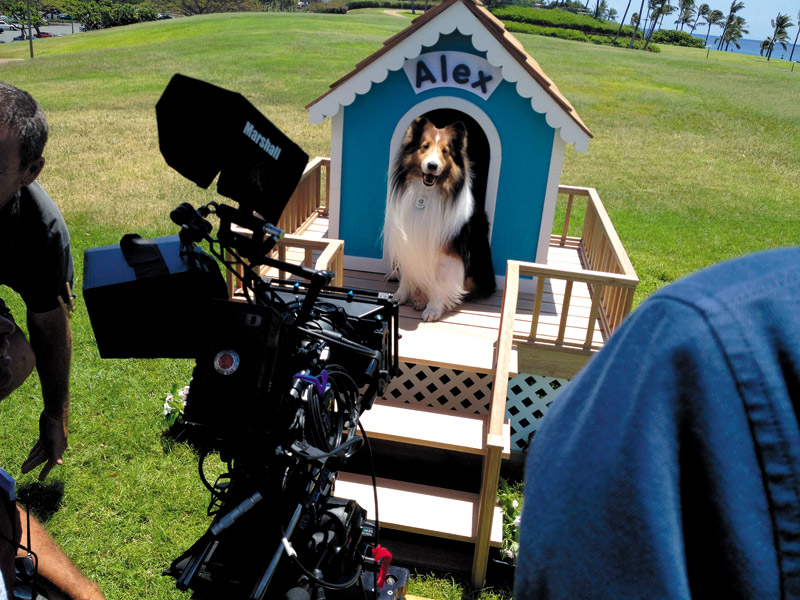
“Nobody would hire me,” he recalls with a laugh.
But fellow USC alumnus Martin “Marty” Schiller did, introducing Sereno to his creative director.
“A week back in Hawai‘i, I didn’t know what was going to happen,” says Sereno. “A week later, he threw this job down. He said, ‘Can you do it?'”
Still, it wasn’t exactly what he had been hoping for. Sereno, whose background had only been in producing commercials, wanted a shot at directing one, too.
His big break eventually came thanks to a partnership The Schiller Group had with Ad 2 Honolulu, a nonprofit that helps other organizations create advertising campaigns. The job was to create a PSA for Missing Child Center – Hawai‘i, Sereno recalls, and his final product ended up being well-received.
“Marty was a big influence to me and throughout my entire career,” says Sereno. “He took a chance on me; allowed me to direct. The third spot I ever did was a Bank of Hawai‘i spot. They had this new thing called electronic banking … I pitched them this crazy idea and they let me direct it. I was young, crazy — but Marty took a chance on me.
“After that, it sort of just took off,” he adds. “Little by little, I got more work and more work.”
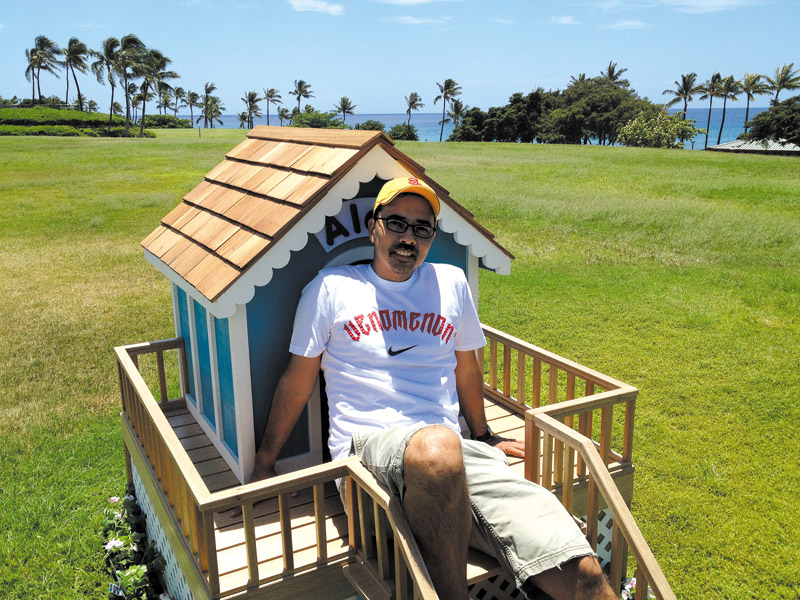
A conversation with Sereno is not unlike sitting through a movie. He drops his voice and pauses at just the right moments for dramatic effect. He’s funny and charismatic, too.
He talks and talks, and then before you know it, an hour has passed. Every story is bursting to be told. At one point, for example, he quickly brings up his work with Central Pacific Bank before dishing all the details anyway. (Fun fact: Alex, the Central Pacific Bank sheltie, was almost a golden retriever instead.)
But it’s exactly why clients enjoy working with him.
“My first and lasting impression of James as the director of some of our TV commercials is his pure passion for telling a story with the level of creativity and vision that’s needed to tell a story in a video,” says Wayne Kirihara, executive vice president and chief marketing officer at Central Pacific Bank.
“He and his team are a lot of fun to work with,” adds Cindy Adams, president and CEO of Aloha United Way. “They get as excited as we get. We feel like they are a part of our organization … They understand our passion for the work that we do; they understand the passion of our donors.”
Today, Kinetic Productions includes four directors who work with ad agencies and directly with clients. Along with an extensive portfolio of local work, Kinetic Productions also has taken on big-name Mainland companies, such as Levi’s and Sunrun.
It’s a collaborative process, to hear Sereno explain it. Often, the ad agency or company might already have an idea of what they want in mind. When Sereno is brought on board, his role is to help shape the story.
“He has a vision,” says April Rutherford, vice president and creative director at Anthology Group. “He just helps expand your vision and brings up other possibilities that you might not have thought of, and that’s really a gift.”
The finished product, of course, turns out to be a brief, 30-second spot. But Sereno believes there is so much more to it.
“There’s a story there,” he says. “There’s a beginning, a middle, an end.”
Several years ago, Sereno approached local author Chris McKinney after reading his book The Tattoo. Sereno had enjoyed it so much that he wanted to collaborate on a project together. Eventually, McKinney penned Paradise Broken, which marked Sereno’s first time directing a feature film.
“There are a lot of things that I have respect for when it comes to him, but I think one of the biggest things is that when he says he’s going to do something, he does it,” says McKinney. “It was the first time I met a guy who says — he said, ‘Let’s do this,’ and then he did it.”
Throughout the years, Kinetic Films — which Sereno established after his success with Silent Years — has put out a few films in addition to Paradise Broken, called Hang Loose and Man Up. All received major distribution, the latter by Lakeshore Entertainment, and are set in Hawai‘i with actors of Asian descent in the lead roles. (Sereno’s cast often features Dante Basco of ’90s Hook fame, Justin Chon and Kevin Wu, a YouTube star better known as KevJumba.)
It’s quite unlike anything moviegoers are probably accustomed to. The stories Sereno tells here are not serious explorations of Asian identity or paradisiacal views of Hawai‘i.
It isn’t so much that Sereno is trying to make a grand statement. He’s just doing what he knows.
He likens his perspective to that of Martin Scorsese, whose films frequently portray a world of crime in New York born from firsthand experience, or of Spike Lee.
In Sereno’s films, Asian characters happen to be normal people living in a Hawai‘i that resonates with residents. Man Up, for example, follows an immature Asian man whose white girlfriend unexpectedly gets pregnant. No one speaks with an accent. The Asian characters are far from academically intelligent. It is, in other words, void of the usual Hollywood stereotypes.
“This Hawai‘i and these characters, I know,” says Sereno. “I feel like the best way as an artist to express is to make what you know first, and tell it from that point of view … I want to tell Asian-American stories, and that’s why I came back home,” he adds. “Asian Americans are very underrepresented in film, television and everything. It’s a hard journey to carry.
“I hope … I can have Asian leads and people can see that and they can say, ‘Oh, wow, a story set in Hawai‘i with Asian leads is still interesting to me,'” he adds. “That’s actually my dream, truthfully.”
Up next for Sereno, he and McKinney, with whom he frequently collaborates, are getting ready to shoot a short film at the end of the year. Titled Haole and set in Kahalu‘u, the story follows three young boys and is a mystery of sorts that touches upon themes of race, identity and land ownership in Hawai‘i.
The two also are shopping around a gritty, six-episode limited-release show based off of McKinney’s book, Yakudoshi: Age of Calamity, to the likes of Netflix and Hulu. Set in Kaka‘ako, Sung Kang of Fast and Furious fame and Chon are attached to star in it.
Sereno also recently served as executive producer for Chon’s critically acclaimed film Gook, which explores a Korean-American perspective to the LA riots in the ’90s. The film won the NEXT Audience Award at the 2017 Sundance Film Festival,was released nationwide in August, and debuts on iTunes Dec. 5. (Though Sereno points out that he didn’t have much involvement in the film beyond financial support.)
Ultimately, in everything Sereno does, it’s about never feeling satisfied or finished. It isn’t formulaic. He doesn’t want to create just one outstanding and replicable product.
He likens it to the idea of opening an ice cream shop, and then another and another because of its success. No, what Sereno wants to do is open an ice cream shop and bakery and salon and any number of businesses — all of which are met with rave reviews.
“I’m always starting with a blank slate,” he says. “It’s invigorating because I’m only as good as my last thing … Every project is unique. Every project is fresh. And it keeps me alive because I have to evolve my game.”





